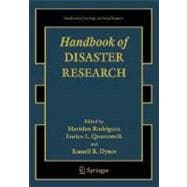
Note: Supplemental materials are not guaranteed with Rental or Used book purchases.
Purchase Benefits
What is included with this book?
| Editor's Introduction | |
| What is a Disaster? | |
| A Heuristic Approach to Future Disasters and Crises: New, Old, and In Between Types | |
| The Crisis Approach | |
| Methodological Issues | |
| The Role of Geographic Information Systems/Remote Sensing in Disaster | |
| Morbidity and Mortality Associated with Disasters | |
| Race, Class, Ethnicity, and Disaster Vulnerability | |
| Gender and Disaster: Foundations and Directions | |
| Globalization and Localization: An Economic Approach | |
| Local Emergency Management Organizations | |
| Community Processes: Warning and Evacuation | |
| Search and Rescue Activities in Disasters | |
| Community Processes: Coordination | |
| Sustainable Disaster Recovery: Operationalizing an Existing Agenda | |
| Sheltering and ousing Recovery Following Disaster | |
| Businesses and Disasters: Vulnerability, Impact and Recovery | |
| Organizational Adaptation to Disaster | |
| Community Innovation and Disasters | |
| Disaster and Development Research and Practice: A Necessary Electicism? | |
| National Planning and Response: National Systems | |
| Disaster and Crisis Management in Transitional Societies: Commonalitites and Regularities | |
| Terrorism as Disaster | |
| Recent Developments in U.S. Homeland Security Policies and Their Implications for the Management of Extreme Events | |
| Unwelcome Irritant or Useful Ally: The Mass Media in Emergencies | |
| The Popular Culture of DIsaster: Exploring a New Dimension of Disaster Research | |
| Remembering: Community Commemorations After Disaster | |
| Research Applications in the Classroom | |
| From Research to Praxis: The Relevance of Disaster Research for Emergency Management | |
| Communicating Risk and Uncertainty: Science, Technology, and Disasters at the Crossroads | |
| Crisis Management in the 21st Century: "Unthinkable" Events in "Inconceivable" Contexts | |
| New Dimensions: The Growth of a Market in Fear | |
| Disasters Ever More? Reducing U.S. Vulnerabilities | |
| References | |
| Table of Contents provided by Publisher. All Rights Reserved. |
The New copy of this book will include any supplemental materials advertised. Please check the title of the book to determine if it should include any access cards, study guides, lab manuals, CDs, etc.
The Used, Rental and eBook copies of this book are not guaranteed to include any supplemental materials. Typically, only the book itself is included. This is true even if the title states it includes any access cards, study guides, lab manuals, CDs, etc.